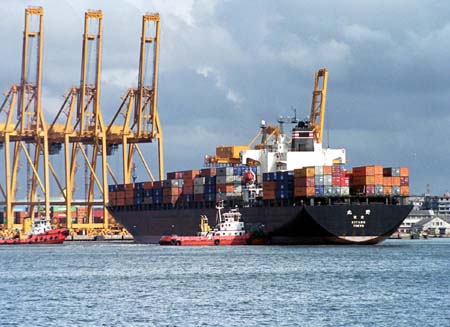
Sri Lanka’s port workers have said they would rather the Sri Lankan Parliament be handed over to India than allow for Indian-led investment to develop the East Container Terminal (ECT) at the Colombo Port, as opposition to the project continues to grow.
Workers at the Colombo port have been leading protests against the project and have even offered to find the money to build it themselves.
A leader of the protesting workers Shyamal Sumanaratne proclaimed that they would raise $500 million dollars themselves to construct the terminal, but did not elaborate on any such plans.
“If the government wants to hand over something to India then give them the parliament or the temple trees,” he said. “Leave east container terminal that we built alone.”
The development of the port was initially agreed in May 2019 by the previous Sri Lankan regime, when former prime minister Ranil Wickremesinghe signed a memorandum of cooperation (MoC) with India and Japan to upgrade the terminal. The deal would have allowed the Sri Lanka Ports Authority (SLPA) to retain full ownership, whilst India and Japan had a 49% stake in running the terminal.
Earlier this year Sri Lanka’s prime minister Mahinda Rajapaksa announced the formation of a committee to examine the $700 million dollar deal between Colombo and New Delhi, after pressure from trade unions provoked long-standing anti-Indian sentiment. Sinhala nationalist groups have longed voiced their objecting to any “foreign involvement”.
Over 70% of the transhipment business at the ECT comes from India.
"We heard that there is a lot of pressure from India over this project,” Shyamal Sumanarathna, secretary of the Ports, Commerce Industries and Progressive Workers Union told the Nikkei Asian Review earlier this year. “But we are not a province of India, we are a sovereign nation and we do not need to dance to their tunes.”
We need your support
Sri Lanka is one of the most dangerous places in the world to be a journalist. Tamil journalists are particularly at threat, with at least 41 media workers known to have been killed by the Sri Lankan state or its paramilitaries during and after the armed conflict.
Despite the risks, our team on the ground remain committed to providing detailed and accurate reporting of developments in the Tamil homeland, across the island and around the world, as well as providing expert analysis and insight from the Tamil point of view
We need your support in keeping our journalism going. Support our work today.
For more ways to donate visit https://donate.tamilguardian.com.

